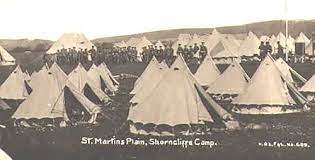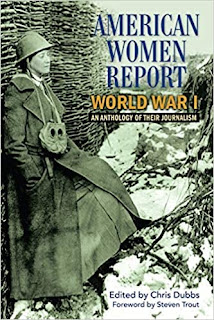The following was sent to Christine Warren, by Chris Long. Christine, who runs the Folkestone Then & Now website
https://www.warrenpress.net/FolkestoneThenNow/FolkestoneThen_Now.html
has very kindly given me permission to post this on my Forgotten Poets weblog
Chris Long says :
"This was given to my father Horace by his father Alfred after the Great War, He told me it was given to all the Folkestone lads who served in the 1st, 2nd, 3rd, 4th or 5th Folkestone Battalion at the end of the war in 1918 by the Folkestone Council. I don’t know why, or indeed if it was ever sung.”Here are the words to the song - kindly typed out for us by Christine Warren:
“The Gallant Little Buffs” by Folkestone Town Crier Jack Anderson
To the Tune of "Marching to Georgia”
Lord Kitchener's appeal has been nobly responded to
By our brave Folkestone lads who've rallied round the Red
and Blue.
Father, Mother, proud are you
Whose sons enlisted in the Buffs for Egypt.
CHORUS.
Hurrah! Hurrah ! for the gallant little Buffs
Hurrah ! Hurrah ! each man is true and tough
And they'll give the Germans quite enough
before they arrive in Egypt.
Good luck, Good luck to all our Folkestone boys.
Shout out, Shout out, and make a joyful noise.
For they'll take the German Kaiser by surprise,
Before they arrive in Egypt,
CHORUS.
There's brave Captain Atkinson and Commander Gosling
They've left their homes to fight for Country and their King
And their praises let us sing
As they lead the gallant Buffs to Egypt.
God save the King.
Lyrics composed by Jack Anderson, Town Crier, Folkestone.
According to my research, Jack (known as Chopper) Anderson was born in Ireland in 1849.Jack was Folkestone’sTown Crier from c. 1910 until he died in 1931.
Evidence of that is on the 1911 Census in which Jack, listed as John Anderson, described himself as "Town crier - born in Westport Maye Ireland" His wife was Sarah Anderson, nee Philpott, born in Saltwood, Kent in around 1860.
The couple were living in Myrtle Road Folkestone, Folkestone, Kent, England and had two children - Jessie and William.
Jack died on 17th September 1931 and was buried in Cherton Road Cemetery, Folkestone.
The Buffs were The Royal Kent Regiment
The Buffs were one of the first infantry regiments in the British Army. With origins dating back to 1572 when Queen Elizabeth I supplied military aid to Protestant rebels in the Netherlands against King Phillip II of Spain. Until the 1751 reforms, regimental units were commonly named after their current Colonel. The Buffs reverted to this practice when Prince George of Denmark died in 1708, although it was also referred to as the 'Holland Regiment' or "Buffs" after its coat facings. Stationed in Canterbury at the outbreak of war, The Buffs then moved to Dover where they remained.
 |
| Buffs Boer War Memorial Canterbury, Kent, UK |
The Regiment took part in many campaigns in the years that followed. In 1961, after nearly 400 years of distinguished service, the Regiment became part of The Queen's Own Buffs, The Royal Kent Regiment.
Sources: Find my Past, Free BMD,
https://www.warrenpress.net/FolkestoneThenNow/FolkestonePeople.html
https://www.warrenpress.net/FolkestoneThenNow/FolkestoneMilitary&Wartime.html
http://www.machadoink.com/Military2.htm
https://www.nam.ac.uk/explore/buffs-royal-east-kent-regiment








